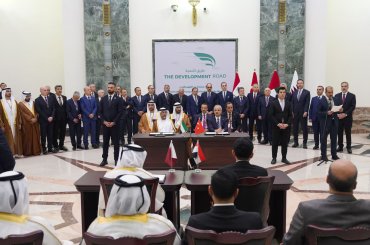
“Not ready to die in your war,” billboards from the “Israel loves Iran/Iran loves Israel” campaign. (Photo: Israel Loves Iran/Twitter)
The prospect of resolving the Iranian nuclear crisis is bleak indeed. Sanctions have driven Iran’s currency to record lows and have taken a tight hold on Iran’s crude oil export industry. Yet there is no sign of a change in position within Tehran’s leadership regarding its nuclear program. Moreover, it is becoming clear that the sanctions are hurting ordinary Iranians, innocent citizens who, even if they wanted to, could not effectuate policy change within their country’s non-democratic government.
The military option appears even less promising. The prospect of a joint U.S.-Israeli military strike on Iran’s nuclear sites seems as remote as ever given the recent diplomatic rift between the two countries regarding establishing Iranian red lines and in light of the upcoming American presidential election. Without the advanced munitions of the United States and its ability to launch a prolonged air campaign, an Israeli attack would only set back the Iranian nuclear program at best about two years according to most experts. According to a report by the Iran Project released on September 13, 2012, even with the help of the United States the program would only be set back by four years.
Consider the grave costs of an Israeli attack. Scores if not hundreds of innocent Iranian citizens would be killed during the Israeli offensive. Iranian and Hezbollah missiles would rain down on Israeli cities by the thousands causing mass Israeli casualties. Vital infrastructure would be destroyed in both countries and there would be widespread economic turmoil. Israel would be the target of international condemnation and would be further isolated in the international arena. Terrorist cells would attack Israeli and Jewish targets worldwide. The mullahs of Iran would consolidate power as a result of the Iranian population uniting against an external enemy (See Iran-Iraq War). The Middle East would further destabilize. The chaos that would disrupt vital oil shipping lanes would send shockwaves throughout the global oil market. And perhaps most ironically, the Iranians would now have a retroactive justification for possessing nuclear weapons in the first place – to deter and defend against foreign invasion.
Is setting back the Iranian nuclear program two or even four years worth these and other unknowable consequences? This is all in addition to the fact that Israel, either with or without the help of the United States, would ostensibly have to, perhaps in perpetuity, return to Iran every four or six years to set back the program again and again. Sanctions and war do not offer a solution here, and creative thinking is thus far lacking.
If only a peace deal were to be achieved between the Palestinians and the Israelis. If the Palestinian-Israeli conflict were to disappear, Iran would be deprived of its self-styled role as fearless champion of the Palestinian cause – the pretext that provides cover for Iran’s quest for regional hegemony, that gives its anti-Zionist threats popular support on the Iranian and Arab streets, and that drives its fervent “Death to Israel” scapegoat policy. A permanent peace agreement resulting in a viable Palestinian state would force a major political recalibration in Iran as Israel could no longer be portrayed as the “Little Satan” that kills and humiliates oppressed Muslims. Maintaining such a stance in the face of a peace agreement would undermine the Palestinians’ national right to self-determination. In short, Iran’s leverage in the nuclear face-off would be diminished if the occupation were over. In such an admittedly fantastical future (given Netanyahu’s record on Palestinian “peace efforts”), with artificially inflated tensions somewhat eased, perhaps the United States, or even Israel, could openly engage Iran in direct and open negotiations and real diplomacy could be given a chance. It is important to remember that Iran and Israel are not natural enemies, but rather natural allies in an Arab-dominated Middle East. The two countries had good relations under the rule of the Shah, and while their governments are sworn enemies, their youth interact in anti-war social media campaigns (iranlovesisrael.com and israellovesiran.com), and share literature and music. Israeli and Iranian youth are among the most educated, fashion-minded and tech-savvy populations in the Middle East.
All of this isn’t to imply Israel is to blame for the current Iranian impasse or that the failure to reach an accord with the Palestinians is the sole fault of Israel. Hamas’ rejectionism, the Palestinian Authority’s (PA) unpopularity among its own people, and the failure of both Hamas and the PA to work out a reconciliation deal also pose formidable obstacles to peace. This also isn’t to say Iran would all a sudden give up its goal of becoming a Middle East power or scrap its nuclear program upon hearing an Israeli-Palestinian peace agreement was hatched out. The program itself has nothing to do with the Palestinians. It is a strategy that has balance-of-power and deterrence-based dimensions that go well beyond Israel–to the broader Sunni-Shi’a conflict and competition with Saudi Arabia, Egypt and Turkey for regional dominance.
But recent polling shows neither the Israeli nor the American public think a war with Iran is necessary at the moment. Highly trusted defense and intelligence officers within Israel and America have voiced similar opinions. Tougher rounds of sanctions can always be applied, but if history is any indication, they will only mean more suffering on the part of the Iranian populace and no significant policy change within the Iranian government regarding its nuclear program. With no popular support for war, a high-confidence military or economic option, it is essential that the West find ways to weaken Iran’s geo-political position and justification for its bellicose posturing. A concerted revitalization of the peace process is one way with no downside. Peace with the Palestinians is in Israel’s national interest regardless of the Iran issue, as it is a moral and security imperative.
The path of direct diplomacy with Iran has a greater chance of providing a workable solution than either military or economic warfare. This path, however, will never be open until the Palestinians have their own state.



“All of this isn’t to imply Israel is to blame for the current Iranian impasse or that the failure to reach an accord with the Palestinians is the sole fault of Israel.”
Actually, the sole fault in both of these situations IS Israel’s.
“All of this isn’t to imply Israel is to blame for the current Iranian impasse or that the failure to reach an accord with the Palestinians is the sole fault of Israel. ”
I disagree, to an extent. “Sole,” perhaps not. But “primary”? Absolutely. Only Israel has the power to offer what is necessary to reach a deal with the Palestinians. The Palestinians simply have no power other than their defiance.
I could nitpick with some of this, but I agree with the thrust–the key to the Iranian/Israeli problem is Palestine.
Why does nobody in the mainstream press ever ask what Palestinians think about the “existential threat” of an Iranian bomb, supposing it materialized? Or anyhow, I’ve never seen the issue raised, and I’ve written to the NYT asking them why they haven’t asked it. If people are serious about their worries of an Iranian nuclear threat, shouldn’t they be just as concerned about the Palestinians, and why don’t they point out the mutual threat to both? There’s no such thing as a nuclear bomb that only kills Zionists. But the Israelis, who are so desperately afraid of the Iranian nuke threat, never even think to ask how they could marshal world opinion against Iran. They could start treating Palestinians as human beings and then Israelis and Palestinians together would tell the Iranians that their intervention in any form isn’t needed.
But nobody in power seems to want that to happen.
“If the Palestinian-Israeli conflict were to disappear, Iran would be deprived of its self-styled role as fearless champion of the Palestinian cause – the pretext that provides cover for Iran’s quest for regional hegemony, that gives its anti-Zionist threats popular support on the Iranian and Arab streets, and that drives its fervent “Death to Israel” scapegoat policy.”
While it’s true that the IRI uses the Israeli-Palestinian conflict to divert attention from its internal problems, Israeli leaders of both Labor & Likud would also like the “Iranian existential threat” to be around as an attention-grabbing bogeyman, since both Israeli parties prefer a world distracted from the viable-Palestinian-state demand. It’s a mutually-beneficial antagonism between Iran & Israel.
Is this article a new trend for Mondoweiss? It’s a sick trend that would be death on millions of Arabs, and would be death on Iran as well. This trend would only leave “Israel” intact:
With this article, Mondoweiss’s new author has advanced the sickening claim that Iran is the aggressor —
He seems to propose that Israel and the United States contain Iran and preserve the Israeli state, initially with a crappy deal that smothers all backtalk from Palestinians forever, then with an Israeli-Iranian alliance against 300 million Arabs.
Mondoweiss’s new author fantasizes that if only the Palestinians (starving and beaten as they are) can be forced to sign some crappy Oslo-style deal, then Israel will be saved and all pro-Palestinian agitation will be silenced.
He fantasizes about inking a deal that would supposedly make you look like you were AGAINST Palestinian self-determination if you demanded any rights at all for Palestinians.
He fantasizes that this deal will somehow stop Iran from claiming that Israel kills and humiliates oppressed Muslims (even though Israel DOES kill and humiliate oppressed Muslims).
But there’s more:
* Mondoweiss’s new author proclaims that Iran is pursuing a “quest for regional hegemony”
* Mondoweiss’s author claims that Iran is making “anti-Zionist threats” — even though it’s Israel that constantly threatens to bomb Iran, and actually has the means to do it.
* Here is the part that is just plain murder:
Mondoweiss’s author badly wants an alliance between Israel and Iran against the entire Arab world! How many millions of Arabs is he planning for Israel to kill with that alliance? Or is he only kidding when he says “alliance”?
* Mondoweiss’s author does promote something he apparently loves: the phony “Israel loves Iran” media campaign which seeks to legitimize the apartheid state of Israel.
* Mondoweiss’s author then goes way overboard to absolve Israel of blame for its threats against Iran (he calls it a mere “impasse”), and to absolve Israel for its years of genocide against Palestinians (he calls it a mere “failure to reach an accord”).
But wait, there’s more:
* Mondoweiss’s author condemns “Hamas’ rejectionism”, the “Palestinian Authority’s (PA) unpopularity among its own people”, and “the failure of both Hamas and the PA to work out a reconciliation deal” — without mentioning Israel’s wholesale massacres of Palestinians!
* Mondoweiss’s author then repeats his claim that Iran supposedly has a “goal of becoming a Middle East power”.
How does Mondoweiss justify printing such an article, whose venom is directed solely at Arabs and Iranians, apparenly with the main goal of preserving Israel?